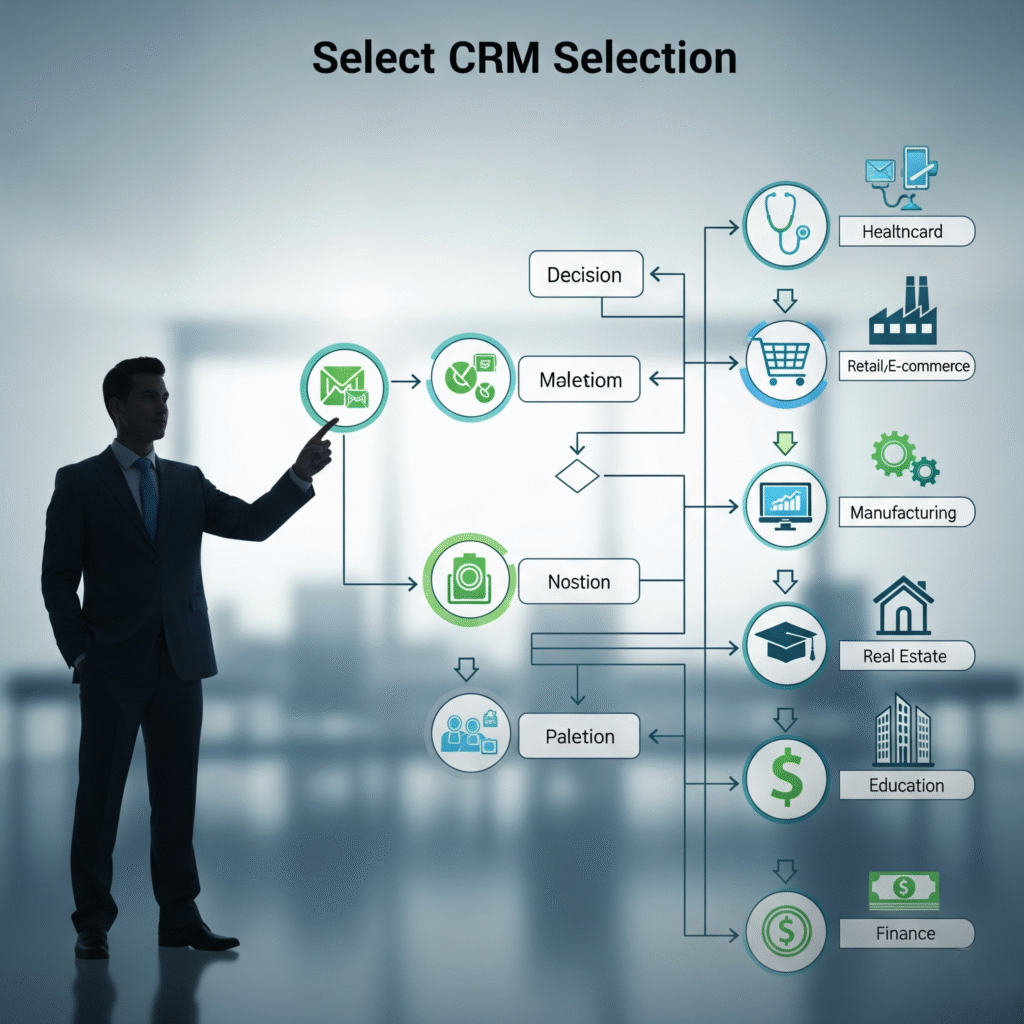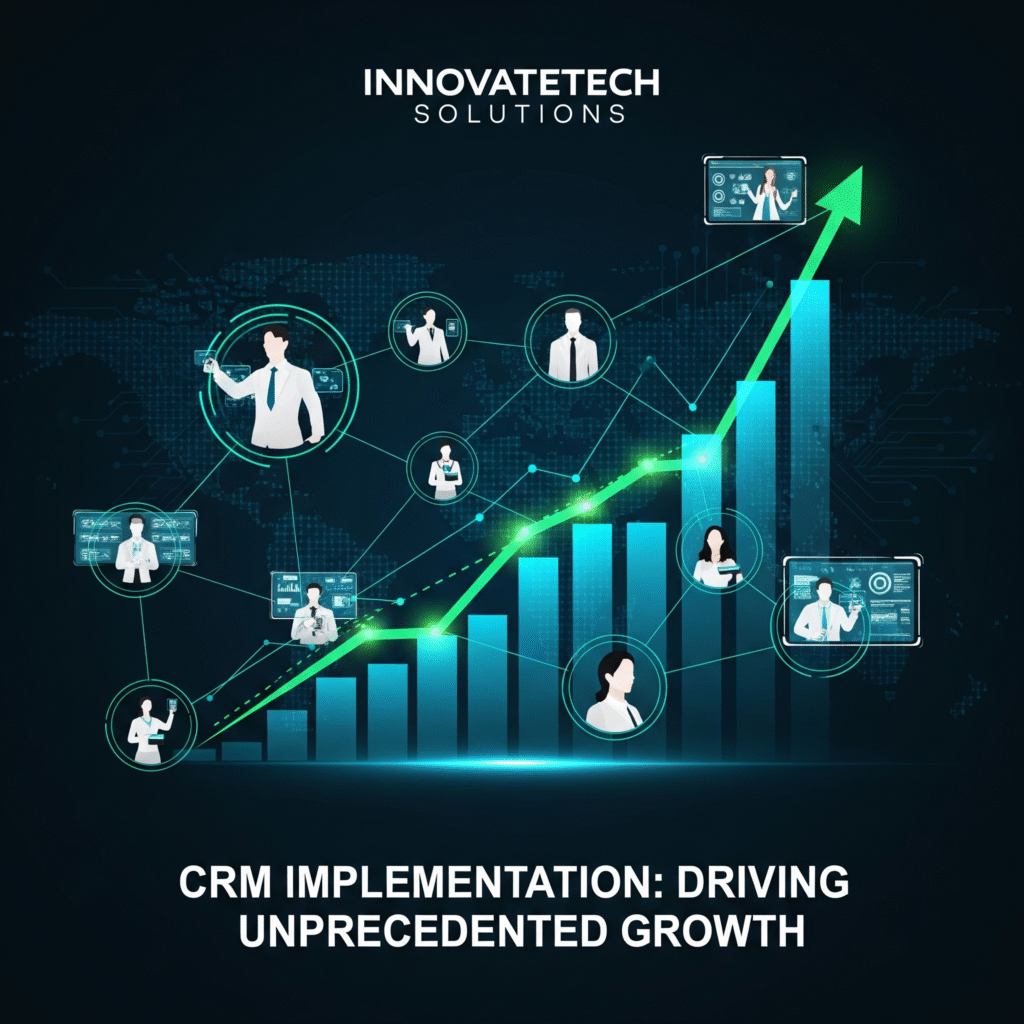How to Choose the Right CRM for Your Industry in 2025
How to choose the right CRM for your industry
Introduction
In today’s hyper-competitive business environment, customer relationships are at the core of growth. A Customer Relationship Management (CRM) system is no longer a luxury—it’s a necessity. But here’s the challenge: not all CRMs are created equal. The best CRM for a real estate company may not work well for an e-commerce brand, and what suits a freelancer may be ineffective for a large enterprise.
So, how do you choose the right CRM for your industry? This guide will walk you through the essential steps, features, and best practices to select a CRM that aligns perfectly with your unique business needs.

How to choose the right CRM for your industry
Why Choosing the Right CRM Matters
A CRM system acts as the backbone of customer management, sales tracking, and business growth. However, a poorly chosen CRM can lead to:
- Wasted investment on unnecessary features
- Low adoption rate by employees
- Poor customer experience
- Integration headaches with existing tools
On the flip side, the right CRM tailored for your industry can:
✅ Improve customer retention
✅ Boost sales productivity
✅ Enhance team collaboration
✅ Provide data-driven decision-making
Step 1: Define Your Industry Needs
Before jumping into CRM comparisons, start with a clear understanding of your industry-specific requirements.
- E-commerce: Needs strong marketing automation, customer segmentation, and order tracking.
- Real Estate: Requires lead tracking, property management, and client communication.
- Healthcare: Needs patient data management with strict data privacy compliance.
- B2B Services: Demands advanced pipeline management, deal tracking, and analytics.
👉 Tip: Write down your top 5 non-negotiable features before evaluating CRM software.
Step 2: Identify Core CRM Features for Your Industry
How to choose the right CRM for your industry
Here are some essential features industries should prioritize:
📊 For Sales-Driven Businesses
- Lead & opportunity management
- Sales pipeline visualization
- Forecasting & reporting
🛒 For Retail & E-Commerce
- Customer segmentation
- Automated email campaigns
- Inventory & order tracking
🏥 For Healthcare & Education
- Secure data storage (HIPAA/GDPR compliance)
- Appointment scheduling
- Multi-user access with role-based permissions
📈 For Marketing Agencies
- Campaign tracking
- Social media integration
- Advanced analytics dashboards

How to choose the right CRM for your industry
Step 3: Evaluate Ease of Use & User Adoption
A CRM is only as good as its user adoption rate. Many businesses fail because employees find the CRM too complex.
✅ Choose a CRM with:
- A clean, intuitive interface
- Mobile accessibility for on-the-go use
- Simple onboarding & training resources
Step 4: Consider Integrations
Your CRM should seamlessly connect with the tools you already use:
- Email & Communication: Gmail, Outlook, Slack
- Marketing Tools: Mailchimp, HubSpot, ActiveCampaign
- Project Management: Trello, Asana, Monday.com
- Accounting: QuickBooks, Xero
👉 This ensures a unified business ecosystem instead of scattered data.
Step 5: Check Industry-Specific CRM Solutions
Some CRMs are built for general use, while others are designed for specific industries.
- Zoho CRM: Great for small businesses with customization options
- HubSpot CRM: Excellent for marketing and inbound sales
- Pipedrive: Perfect for sales-focused businesses
- Salesforce: Best for enterprises with complex workflows
- Monday CRM: Ideal for agencies needing project + sales management
Step 6: Compare Pricing Models
CRM pricing varies widely:
- Free or Freemium Plans: Zoho, HubSpot (basic features)
- Mid-Tier Plans ($20–$50/user/month): Best for growing businesses
- Enterprise Plans ($100+/user/month): Suitable for large organizations
👉 Always compare ROI vs cost instead of just picking the cheapest option.
Step 7: Test Before You Invest
Almost all CRM providers offer free trials. Use this to test:
- User interface & navigation
- Industry-specific customizations
- Mobile functionality
- Reporting dashboards
Case Study: CRM Choice in Different Industries
- Real Estate Agency: A medium-sized agency chose Pipedrive because of its sales pipeline visualization and lead tracking, helping them increase property sales by 35%.
- E-Commerce Store: An online clothing brand adopted HubSpot CRM to automate customer emails, boosting repeat purchases by 28%.
- Healthcare Clinic: A private clinic implemented Zoho CRM with HIPAA compliance, ensuring patient data security while streamlining appointment bookings.

How to choose the right CRM for your industry
Common Mistakes to Avoid
- ❌ Choosing a CRM based only on popularity, not suitability
- ❌ Ignoring integrations with existing tools
- ❌ Overcomplicating with unnecessary features
- ❌ Not involving your team in the decision process
How to choose the right CRM for your industry
Final Thoughts
The right CRM can transform how your business operates, but only if you choose one tailored to your industry needs. By defining your goals, prioritizing essential features, ensuring seamless integration, and testing before committing, you’ll be well on your way to finding a CRM that empowers your team and delights your customers.
In 2025 and beyond, CRM won’t just be about managing customer data—it will be about creating personalized, intelligent customer experiences that drive long-term growth.
How to choose the right CRM for your industry
Check Out Latest Post 👇


Pingback: Marketing Automation Conversion Rates: How to Boost by 35%